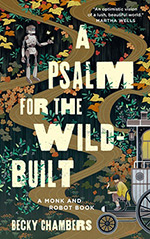
![]() bazhsw
bazhsw
11/13/2025
![]()
What a lovely novella this is, and right now feels like just what I needed (even though I didn't know it). There isn't tons to this story, but then again I didn't expect much. The story is set in a future utopia where the robots have gained sentience, and decided they didn't want to work for humans anymore and said humans had a wake up call and said 'okay'. From there, humans have realised that they had messed up a bunch of stuff and given half the moon they live on to 'the wilds' where the robots live, and on the human half an eco-friendly sustainable society which is intuitively spiritual and where people generally live in harmony (and from what I can see, in the absence of law, government and authority too).
'A Psalm for the Wild-Built' essentially asks the question, 'what do humans need when everything they want, they have?' It's a question I've been pondering a little recently, and I could genuinely empathise with the main character Dex. They are loved, have enough to eat, shelter, interests and comforts. They provide value to the world and people around them, and yet they still feel unfulfilled, as they search for a life's purpose. I was quite struck by noticing my own feelings in this regard, and when I generally am blessed to have my needs met, still find myself searching for purpose - and the answer that I'm just an animal and don't need to have a purpose is both challenging but thought provoking too.
Dex is a tea monk (which is kind of a travelling therapy service where they rock up in villages and serve tea, advice or just listen to the problems folk are going through). And yet they are unfulfilled and in searching for their quest for purpose enter the wilds - a place humans have agreed not to go, and there they meet Splendid Speckled Mosscap, a robot who has volunteered on behalf of the robots to go and 'see how the humans are doing without them' (assumed centuries since they left). There is a brief journey through the wilds to reach Dex's goal and it's really a story of identity and understanding. It gets quite philosophical at times - such as Dex as a non-binary person checking if 'it' was the right pronoun for robots when they learn that robots have no gender either (and I note how my heteronormative mind occasionally tried to overlay a gender on Dex and Mosscap, even ascribing male and female characteristics on them which I find challenging because even though I know better it shows I have work to do). They then get into a conversation about value judgements over the word 'object' and I thought it was cool the arguments around 'you're more than an object' were rebuffed into, 'well what's wrong with being an object'?
The setting isn't to deep and I can see that being an annoyance for some people. It does feel a little 'happy smiley' but I think it's cool that instead of pharmaceuticals we have people listening over tea to make things a little better. It's a place where people have 'first world' problems and whilst no one is starving, that doesn't mean people don't struggle. What it does mean is that social structures support people living mentally and emotionally healthy lives. Pretty cool in my book.
It's a book which highlights that we are more than our constituent parts. Mosscap is more than nuts and bolts, Dex is more than their body. It's basic systems thinking in many respects. When society, or a human having a conversation with a robot combines it's value it creates something new in its stead.
It won't answer your questions, maybe it will give you new ones, but after reading this book I am left with the feeling that whatever I am, whatever my purpose is, that everything will be okay. A positive book in so many ways to wrap up warm with on a cozy afternoon.